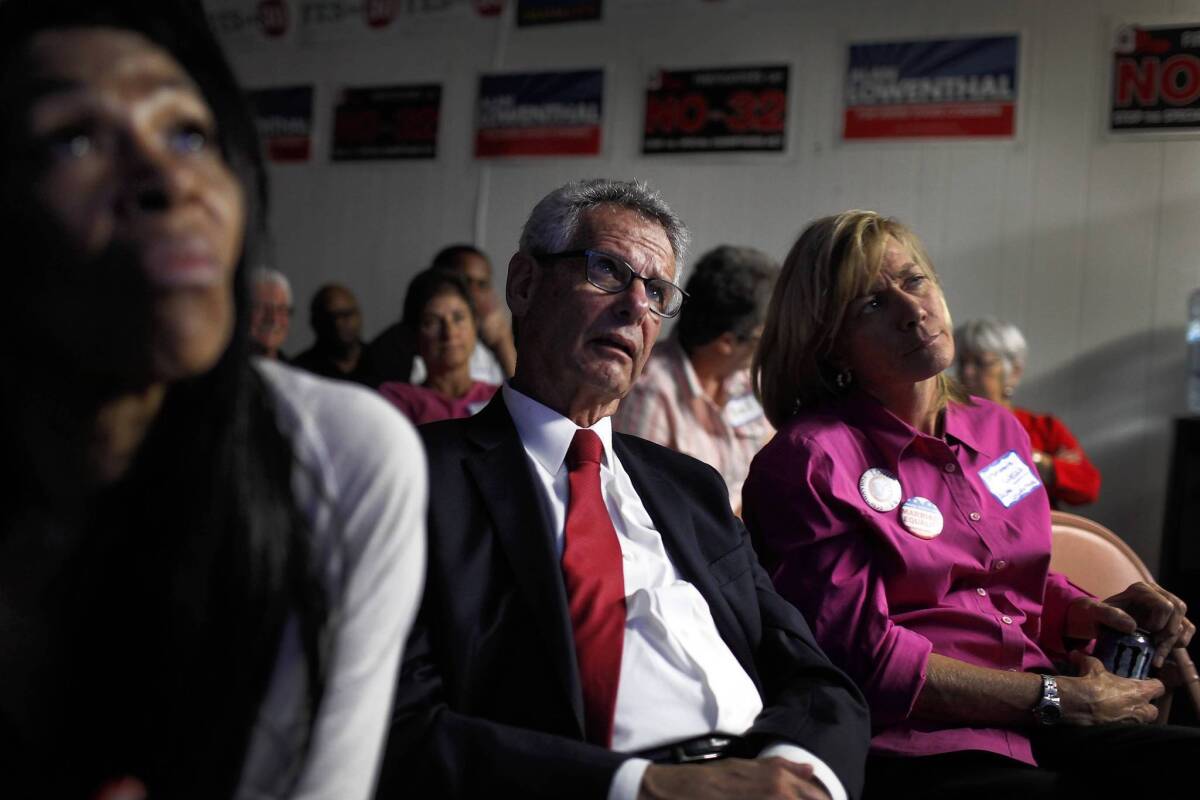In Congress, a restless year for California’s freshman class

WASHINGTON — David Valadao, a soft-spoken California dairy farmer, was barely six months in Congress when he made a splash. He broke from fellow Republicans and voted against cutting off funding for an Obama administration program that stopped deporting young immigrants brought into the country illegally as children.
“Obviously, I have to represent my constituents,” said Valadao, whose Central Valley district is 71% Latino.
Alan Lowenthal — once an influential committee chairman in Democratic-run Sacramento, now a freshman in a Republican-controlled House — showed his constituents that he could still deliver.
He used his post on a committee overseeing fisheries to press the head of the National Oceanic and Atmospheric Administration to commit to keeping open the National Marine Fisheries Service’s Long Beach office.
And Democrat Julia Brownley touted an issue important to her Ventura County district. She went to the House floor to celebrate what she called “one of my state’s most important agricultural assets — the California avocado.”
California’s 14 freshmen — the state’s largest and most diverse class of House members in 20 years — are largely eschewing Capitol Hill tradition that new lawmakers are supposed to be seen and not heard. Since taking office in January, they have looked for opportunities to stand out, voted at times against their party and criticized senior lawmakers — and are polishing their political resumes before next year’s election.
Their legislative marks have been small, however, a reflection of a gridlocked, partisan Congress.
“Some of the dysfunction that you see from the outside is as bad as the dysfunction that you see from the inside,” lamented Rep. Ami Bera (D-Elk Grove).
For former Democratic state lawmakers from Sacramento — where their party reigns supreme and where they chaired committees — working in a Republican-controlled House has been, as Brownley said, a “culture shock.”
“This place is very different. I can introduce as many bills as I want. But I am told that without the right Republican support, they’ll never see the light of day,” said Rep. Jared Huffman (D-San Rafael), who has been frustrated in efforts to line up GOP support for climate change legislation, one of his priorities.
Still, Huffman won House approval for a bill that would expand the California Coastal National Monument, albeit only after Republican leaders had weakened it. The measure awaits a Senate vote.
“Now I know how the other side feels,” added Rep. Gloria Negrete McLeod (D-Chino), who chaired the Senate Public Employment and Retirement Committee in Sacramento. In Congress, she is a junior member of the House Agriculture and Veterans Affairs committees.
The freshmen have pursued an eclectic mix of causes reflecting their diverse backgrounds.
Doug LaMalfa (R-Richvale) was among a group of lawmakers investigating the Department of Homeland Security’s bulk ammunition purchases, citing constituents’ concern that they were drying up supplies for hunting and self-protection. The department, which uses most of the ammunition in training, provided figures showing its purchases were down. Still, LaMalfa is cosponsoring a bill to limit government ammunition purchases. It is pending in committee.
Eric Swalwell (D-Dublin), tech-savvy and at 32 the youngest member of the state’s delegation, wants to establish a mobile Congress that would allow lawmakers to cast votes remotely from their districts and use videoconferencing to participate in hearings. His measure is also pending in committee.
Other freshmen are Republican Paul Cook of Yucca Valley, a retired Marine colonel; and Democrats Juan Vargas of San Diego, a Harvard Law School classmate of President Obama; Scott Peters, a former San Diego councilman and port commissioner; Mark Takano of Riverside, an Asian American teacher; Tony Cardenas, the first Latino Congress member from the San Fernando Valley; and Raul Ruiz of Palm Desert, a physician with three degrees from Harvard.
Bera is the only Indian American in Congress, and Huffman is a former All-American volleyball player.
Bera drew the attention of party leaders after voting against the Democratic budget. He regarded all the budgets as political documents that failed to address the debt “in a balanced way.”
Ruiz condemned comments from the more senior Rep. Steve King (R-Iowa), who suggested that many young immigrants brought into the country are drug runners. Ruiz called the remark “a disgrace to this institution.”
Some of their legislative actions have been focused on California.
Valadao, a former state assemblyman who went from Republican minority member in Sacramento to a prime assignment on the House Appropriations Committee, included in a committee-approved bill a measure that could derail California’s bullet train project.
Cook won a spot in a House-passed defense bill to save a popular off-road recreational vehicle site in his district when the site was threatened by a proposed military base expansion.
But neither measure has made it through the Democratic-run Senate — and they might not ever.
Freshman Democrats have found other ways to try to grab attention. Vargas has bused tables at a Chula Vista pizza joint and attended federally funded nutrition classes in El Centro in what he calls “Undercover Congressman” events. (Unlike in the TV show “Undercover Boss,” he identifies himself.)
Freshman orientation didn’t prepare Lowenthal for his arrival on the House floor to debate the budget. Hardly anybody was there.
“That was a shock to me. I thought this was a place of great debate,” he said.
A number of the freshmen arrived promising to promote bipartisanship. The liberal Huffman and conservative LaMalfa are cosponsoring legislation to toughen the penalties for cultivating pot on federal land — a problem in their districts.
But bipartisanship has been elusive, especially with a number of the newcomers already targeted for defeat by the opposing party.
“We’re not naive,” Swalwell said. “We know that change doesn’t happen overnight.”
More to Read
Sign up for Essential California
The most important California stories and recommendations in your inbox every morning.
You may occasionally receive promotional content from the Los Angeles Times.











